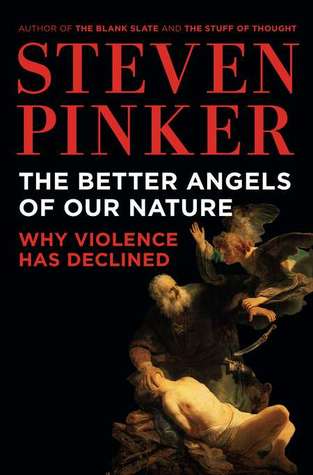Sophistication of Political Discourse
Sophistication of Political Discourse. Finally, let’s have a look at political discourse, which most people believe has been getting dumb and dumber. There’s no such thing as the IQ of a speech, but Tetlock and other political psychologists have identified a variable called integrative complexity that captures a sense of intellectual balance, nuance, and sophistication.283 A passage that is low in integrative complexity stakes out an opinion and relentlessly hammers it home, without nuance or qualification. Its minimal complexity can be quantified by counting words like absolutely, always, certainly, definitively, entirely, forever, indisputable, irrefutable, undoubtedly, and unquestionably. A passage gets credit for some degree of integrative complexity if it shows a touch of subtlety with words like usually, almost, but, however, and maybe. It is rated higher if it acknowledges two points of view, higher still if it discusses connections, tradeoffs, or compromises between them, and highest of all if it explains these relationships by reference to a higher principle or system. The integrative complexity of a passage is not the same as the intelligence of the person who wrote it, but the two are correlated, especially, according to Simonton, among American presidents.
Integrative complexity is related to violence. People whose language is less integratively complex, on average, are more likely to react to frustration with violence and are more likely to go to war in war games.285 Working with the psychologist Peter Suedfeld, Tetlock tracked the integrative complexity of the speeches of national leaders in a number of political crises of the 20th century that ended peacefully (such as the Berlin blockade in 1948 and the Cuban Missile Crisis) or in war (such as World War I and the Korean War), and found that when the complexity of the leaders’ speeches declined, war followed.286 In particular, they found a linkage between rhetorical simple-mindedness and military confrontations in speeches by Arabs and Israelis, and by the Americans and Soviets during the Cold War.287 We don’t know exactly what the correlations mean: whether mule-headed antagonists cannot think their way to an agreement, or bellicose antagonists simplify their rhetoric to stake out an implacable bargaining position. Reviewing both laboratory and real-world studies, Tetlock suggests that both dynamics are in play.
Notes:
Folksonomies: rhetoric language
Taxonomies:
/law, govt and politics/politics (0.580127)
/technology and computing/enterprise technology/customer relationship management (0.376243)
/society/unrest and war (0.365601)
Keywords:
integrative complexity (0.958834 (positive:0.094694)), integrative complexity stakes (0.783653 (negative:-0.379649)), political discourse (0.757088 (neutral:0.000000)), Political Discourse Sophistication (0.692775 (neutral:0.000000)), minimal complexity (0.619147 (neutral:0.000000)), psychologist Peter Suedfeld (0.602799 (neutral:0.000000)), Cuban Missile Crisis (0.599737 (neutral:0.000000)), implacable bargaining position (0.596978 (neutral:0.000000)), Tetlock (0.530050 (positive:0.302732)), mule-headed antagonists (0.529662 (neutral:0.000000)), political psychologists (0.526517 (positive:0.283175)), intellectual balance (0.523242 (positive:0.283175)), higher principle (0.522634 (positive:0.495092)), American presidents (0.514868 (neutral:0.000000)), political crises (0.514632 (neutral:0.000000)), Berlin blockade (0.513571 (neutral:0.000000)), real-world studies (0.513183 (neutral:0.000000)), war games.285 (0.513079 (neutral:0.000000)), rhetorical simple-mindedness (0.511751 (neutral:0.000000)), World War (0.511410 (neutral:0.000000)), Korean War (0.511221 (neutral:0.000000)), military confrontations (0.508152 (neutral:0.000000)), Cold War.287 (0.507627 (neutral:0.000000)), 20th century (0.507378 (neutral:0.000000)), national leaders (0.507329 (neutral:0.000000)), passage (0.487186 (positive:0.272887)), nuance (0.459700 (negative:-0.352432)), speeches (0.457319 (neutral:0.000000)), words (0.443198 (positive:0.581601)), violence (0.443132 (negative:-0.395656))
Entities:
Tetlock:Person (0.775898 (positive:0.070701)), World War:FieldTerminology (0.407451 (negative:-0.308302)), Korean War:FieldTerminology (0.405995 (negative:-0.308302)), Simonton:Person (0.345415 (positive:0.426847)), Berlin:City (0.339996 (negative:-0.395220)), Peter Suedfeld:Person (0.325370 (negative:-0.582050))
Concepts:
Cold War (0.987982): dbpedia | freebase
Cuban Missile Crisis (0.584422): dbpedia | freebase | yago
World War II (0.561623): dbpedia | freebase | yago
NATO (0.522427): geo | website | dbpedia | freebase | opencyc | yago
United States (0.454481): website | dbpedia | ciaFactbook | freebase | opencyc | yago
Soviet Union (0.436865): dbpedia | freebase | opencyc | yago
International crisis (0.390239): dbpedia | freebase | yago
Joseph Stalin (0.350549): dbpedia | freebase | opencyc | yago





